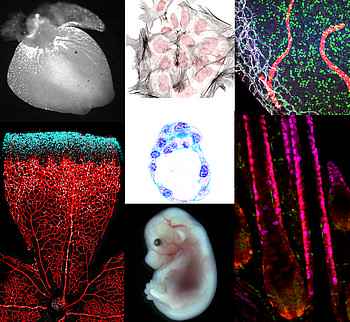Sie befinden sich hier
Inhalt
Research
The Department of Vascular Dysfunction is focusing on molecular mechanisms driving blood and lymphatic vascular growth, regeneration, regression and aging decisions. In particular, we investigate the interplay between nutrient sensing and fate decisions within the developing, mature and diseased vascular system. Our major goal is to apply metabolic angiotargetic approaches for maintaining vascular fitness and youth.
We are a highly motivated young group of vascular biologist that we aim to answer key questions on the field of vascular homeostasis and diseases.

Our Department has 5 scientific hubs:
- Vascular growth, regeneration and regression: Within this scientific hub we are focusing on the metabolic ques that drive vascular growth during development, regeneration after injury and regression.
- Cysteinolytic priming in fate decisions: Within this scientific hub we are focusing on how cysteine catabolism primes cells to exhibit specific fate decisions. In particular we investigate whether cysteinolytic capacity is necessary for stem cell, vascular and cancer cell fate transitions.
- Epi-modifiers in vascular homeostasis and diseases: Within this scientific hub we investigate metabolic fluxes to the epi-translatome, epi-transcriptome and epi-genome that regulate vascular fates.
- Metabolite-protein communication: Within this scientific hub we aim to unravel novel metabolite-protein interactions that alter protein function and drive cell fate decisions in vascular health and disease.
- Aging of the vascular niche: Within this scientific hub we are focusing on the systemic impact of vascular aging in organismal resilience.
A combination of advanced multi-omic approaches with basic vascular and cell biology, novel genetic models and bioinformatic approaches allow us to answer our key questions.
Kontextspalte
Vascular Dysfunction
European Center for Angioscience (ECAS)
Medical Faculty Mannheim
Heidelberg University
Ludolf-Krehl-Straße 13-17
68167 Mannheim
Phone +49 621 383-71871
VascularDysfunction@medma.uni-heidelberg.de
Head

Prof. Dr. Sofia Iris Bibli
